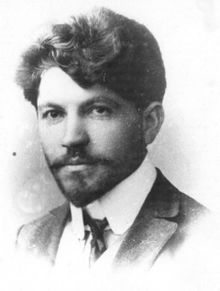| Alexander Bekzadyan | |
|---|---|
| Ալեքսանդր Բեկզադյան | |
 Bekzadyan in 1909 Bekzadyan in 1909 | |
| Ambassador of the Soviet Union to Hungary | |
| In office 17 November 1934 – 20 November 1937 | |
| Preceded by | Adolf Petrovsky |
| Succeeded by | Victor Plotnikov |
| Ambassador of the Soviet Union to Norway | |
| In office 30 October 1930 – 17 November 1934 | |
| Preceded by | Alexandra Kollontay |
| Succeeded by | Ignaty Yakubovich |
| People's Commissar of Foreign Affairs of the Armenian SSR | |
| In office 29 November 1920 – 1 May 1921 | |
| Preceded by | Position established |
| Succeeded by | Askanaz Mravyan |
| Personal details | |
| Born | (1879-09-15)15 September 1879 Shushi, Elizavetpol Governorate, Russian Empire |
| Died | 1 August 1938(1938-08-01) (aged 58) Kommunarka shooting ground, Moscow Oblast, Russian SFSR, USSR |
Alexander Artemyevich Bekzadyan (Russian: Александр Артемьевич Бекзадян; Armenian: Ալեքսանդր Հարությունի Բեկզադյան, romanized: Alexander Harutyuni Bekzadyan; 15 September 1879 – 1 August 1938) was a Bolshevik revolutionary and Soviet statesman of Armenian descent. After serving as Soviet ambassador to Norway and Hungary he was murdered during the Great Purge.
Early years
Alexander Harutyunyi (Artemi) Bekzadian was born in 1879 in Shushi, Nagorno-Karabakh, Russian Empire. He graduated from Shusha Real School. In 1900-1902 he studied at the Kyiv Polytechnic Institute. In 1911, he graduated from the Faculty of Public Policy at the University of Zurich.
He was arrested in Russia as a member of the Baku and Transcaucasian Committees of the Bolshevik party but escaped in 1906. Bekzadyan participated in several conferences of the Russian Social Democratic Labour Party in Europe and Russia and maintained close contact with the figures of the 2nd International from European parties. In 1914, he worked in Baku, then in the North Caucasus.
Soviet career
In 1920-21 he served as deputy chairman of the Revolutionary Committee of Armenia and as the first People's Commissar of Foreign Affairs of Armenian Soviet Socialist Republic. In December 1920 and January 1921, he sent notes to the Turkish government, demanding an end to atrocities against the Armenian population in the occupied Armenian territories, proposing to start negotiations for the return of Kars and Alexandropol to Soviet Armenia.
From 1926 to 1930 he was deputy chairman of the government of the Transcaucasian Soviet Federative Republic and People's Commissar of Trade. Bekzadyan served as the ambassador of the USSR in Norway (1930-1934) and then Hungary (1934–37).
Arrest, execution, and rehabilitation
On 21 November 1937, during the Great Purge, he was arrested and on charges of counter-revolutionary activities and was sentenced to death by the Military Collegium of the USSR Supreme Court. On 1 August 1938, the sentence was carried out at the Kommunarka shooting ground. Bekzadyan was posthumously rehabilitated in 1956.
References
- ^ "Bekzadyan Alexander Artemyevich". Archived from the original on 2020-02-15.
- 1879 births
- 1938 deaths
- Armenian revolutionaries
- Politicians from Shusha
- People from Elizavetpol Governorate
- University of Zurich alumni
- Russian Social Democratic Labour Party members
- Old Bolsheviks
- Communist Party of Armenia (Soviet Union) politicians
- Armenian atheists
- Ambassadors of the Soviet Union to Norway
- Ambassadors of the Soviet Union to Hungary
- Great Purge victims from Armenia
- Soviet rehabilitations
- Members of the Communist Party of the Soviet Union executed by the Soviet Union